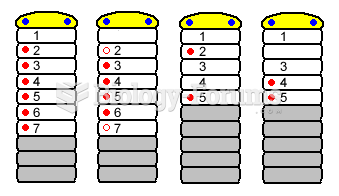|
|
|
The first monoclonal antibodies were made exclusively from mouse cells. Some are now fully human, which means they are likely to be safer and may be more effective than older monoclonal antibodies.
More than 50% of American adults have oral herpes, which is commonly known as "cold sores" or "fever blisters." The herpes virus can be active on the skin surface without showing any signs or causing any symptoms.
Cucumber slices relieve headaches by tightening blood vessels, reducing blood flow to the area, and relieving pressure.
The most common childhood diseases include croup, chickenpox, ear infections, flu, pneumonia, ringworm, respiratory syncytial virus, scabies, head lice, and asthma.
Approximately 25% of all reported medication errors result from some kind of name confusion.
 Space-filling model of an actin filament (shades of red) with one myosin head (gray and two shades o
Space-filling model of an actin filament (shades of red) with one myosin head (gray and two shades o
 Holding the head with one hand, apply effleurage to upper trapezius on one side using the fist. When ...
Holding the head with one hand, apply effleurage to upper trapezius on one side using the fist. When ...





